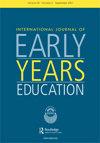All things being equal
IF 1.3
Q2 EDUCATION & EDUCATIONAL RESEARCH
International Journal of Early Years Education
Pub Date : 2022-05-19
DOI:10.1080/09669760.2022.2069357
引用次数: 0
Abstract
The United Nations advocates that children’s experiences of growing up should be characterised by equality (OHCHR 1989; United Nations 2015). Yet even before COVID-19 emerged, inequalities were a global problem for early childhood, which matters because ‘Inequalities in early childhood development tend to persist into adulthood and amplify across the life course’ (Lu et al. 2020, 1). We know that there are strong associations between inequalities and wicked problems including low life expectancy, paucity of educational and health outcomes, weak development of human capital, lack of social mobility and failed social cohesion (Wilkinson and Pickett 2010, 2018). Nevertheless, in 2022 as the World emerges from global pandemic shock, aspirations that young children worldwide may experience equality seem less achievable than ever. Beginning in February 2022, Europe has experienced another wave of displaced children forced to migrate due to conflict in their Ukrainian homeland, further exacerbating inequalities experienced by children (UNICEF 2022a). UNICEF (2022b) identifies regressive democracy, globalisation and multilateralism, combined with climate change and weak regulation of digital technologies as key factors that are intensifying inequalities for young children internationally. I am profoundly sad that equality for the World’s children seems to be moving further from our grasp. That said, I cannot claim an authentic first-hand understanding of what it is to be denied opportunities or to feel othered, disenfranchised or subjugated because of ethnicity, socio-economic status, geographical location or other characteristics. As a white, educated woman indigenous to the wealthy United Kingdom, my life has been characterised by advantage. Since my birth into middle-class, middle-England in the mid-twentieth century, I have been afforded freedoms, comforts and opportunities that most others never know. Moreover, through nothing other than an accident of birth, I belong to a dominant culture that has historically wielded power to subjugate others across the World: a stain on my country’s past. I wish it were otherwise. I feel not only sorrow but also anger in the face of the many disadvantages that inequalities have constructed for children over centuries and that these have dogged them throughout their lives, frequently being passed to subsequent generations. I long for a World where diversity is celebrated, where power and resources are shared equitably, and where opportunity and inclusion are experienced universally. I am wholly committed to doing all I can to secure that more equal World, but as one person my contribution is limited. Nevertheless, as Editor of the International Journal of Early Years Education I am in a position to bring together people to promulgate new knowledge with potential to inform possibilities for leveraging equality in early childhood in the future. To that end, this issue of International Journal of Early Years Education is a curated collection of articles that constitutes a shared commitment to working towards a more equal World and a better future for all, beginning with early childhood. The size of this bumper issue reflects the importance we place on issues of equality in early childhood at International Journal of Early Years Education. Most of its articles are grouped into themes covering early childhood development (ECD) inequalities, young children as migrants and refugees, cultural diversity in early childhood, and special educational needs在所有条件都相同的情况下
(2022)。一切都是平等的。国际幼儿教育杂志:第30卷,第2期,第127-129页。
本文章由计算机程序翻译,如有差异,请以英文原文为准。
求助全文
约1分钟内获得全文
求助全文
来源期刊

International Journal of Early Years Education
EDUCATION & EDUCATIONAL RESEARCH-
CiteScore
2.30
自引率
5.30%
发文量
50
 求助内容:
求助内容: 应助结果提醒方式:
应助结果提醒方式:


